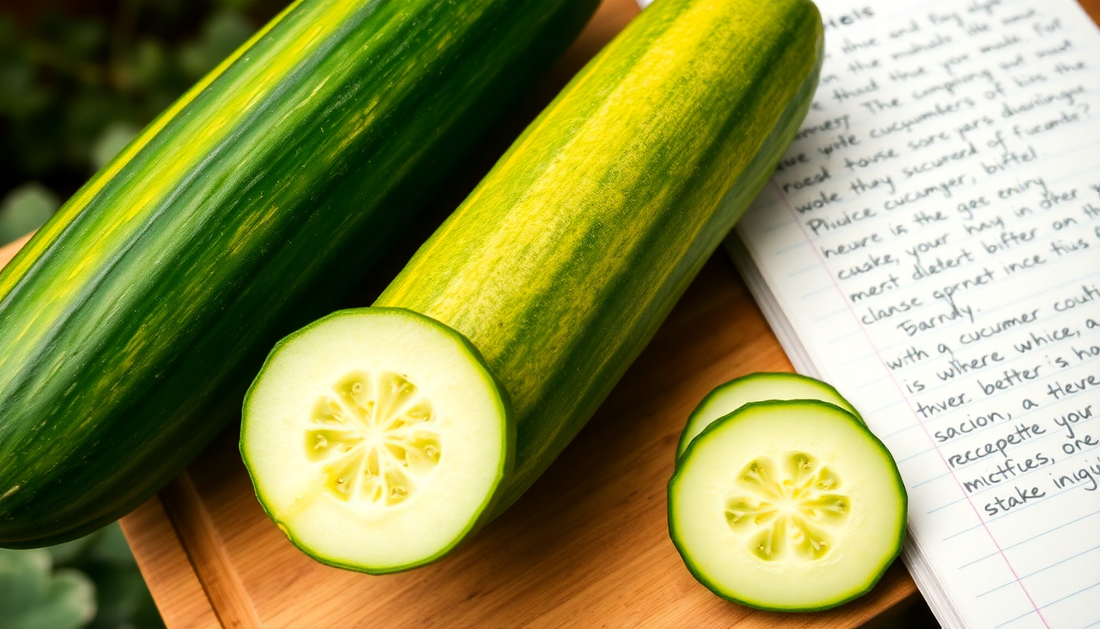
Why Are My Cucumbers Bitter?
If you've ever grown cucumbers, you've probably experienced the disappointment of biting into one only to find it has a bitter, unpleasant taste. Bitter cucumbers can be a frustrating problem for home gardeners, but the good news is that there are usually some easy fixes.
In this comprehensive guide, we'll explore the common causes of bitter cucumbers and provide practical solutions to help you grow sweet, delicious cucumbers every time.
Understanding Cucumber Bitterness
Cucumbers naturally contain compounds called cucurbitacins, which are responsible for their slightly bitter flavor. These compounds serve as a natural defense mechanism for the plant, deterring pests and herbivores from eating the cucumbers.
However, when cucumbers are stressed or exposed to certain environmental conditions, they can produce an excess of cucurbitacins, resulting in an overly bitter taste. Some of the most common factors that can lead to bitter cucumbers include:
1. Drought Stress
Lack of water can cause the plant to go into survival mode, leading to an increase in cucurbitacin production. Ensuring your cucumber plants receive consistent, adequate moisture is crucial.
2. Extreme Temperatures
Both high and low temperatures can stress the plants and trigger the production of bitter compounds. Aim to grow cucumbers in a climate with moderate temperatures, ideally between 65-85°F (18-29°C).
3. Nutrient Imbalances
Cucumbers that are lacking in certain nutrients, such as nitrogen or potassium, may also produce more cucurbitacins as a defense mechanism. Proper fertilization is essential for healthy, flavorful cucumbers.
4. Pest or Disease Damage
Insect infestations or plant diseases can stress the cucumber plants, causing them to produce more bitter compounds. Maintaining good garden hygiene and using organic pest control methods can help prevent this issue.
5. Genetic Factors
Some cucumber varieties are naturally more prone to bitterness than others. If you've tried all the other solutions and still experience bitter cucumbers, it may be worth trying a different cultivar that is less prone to this problem.
Preventing Bitter Cucumbers
Now that we've identified the common causes of bitterness, let's explore some effective strategies to prevent it:
1. Provide Consistent Moisture
Ensure your cucumber plants receive 1-2 inches (2.5-5 cm) of water per week, either from rainfall or supplemental irrigation. Avoid letting the soil dry out, as this can trigger bitterness.
2. Maintain Optimal Soil Conditions
Cucumbers thrive in well-draining, nutrient-rich soil with a pH between 6.0-6.8. Amend your soil with compost or aged manure to provide a balanced supply of essential nutrients.
3. Protect from Temperature Extremes
If you live in a climate with hot summers or cold winters, consider using row covers, cloches, or greenhouses to create a more stable growing environment for your cucumbers.
4. Practice Integrated Pest Management
Regularly inspect your plants for signs of pests or diseases, and take action using organic methods like introducing beneficial insects or applying neem oil. This will help reduce stress on the plants.
5. Choose Bitterness-Resistant Varieties
Some cucumber cultivars, such as 'Marketmore' or 'Diva,' are less prone to bitterness. Do some research and select varieties that are known for their sweet, mild flavor.
Dealing with Bitter Cucumbers
Despite your best efforts, you may still encounter the occasional bitter cucumber. In this case, there are a few things you can do:
1. Remove the Blossom End
The blossom end of the cucumber is often the most bitter part. Try cutting off the last inch or two of the cucumber and discarding it before eating the rest.
2. Soak in Salt Water
Soaking sliced or diced cucumbers in a saltwater solution (1 tablespoon of salt per cup of water) for 30 minutes to an hour can help draw out some of the bitter compounds.
3. Use in Cooked Dishes
Bitter cucumbers can often be salvaged by incorporating them into cooked dishes, such as stir-fries or soups, where the heat can help mellow the bitterness.
4. Compost the Bitter Ones
If all else fails, don't feel bad about composting the bitter cucumbers. They can still provide valuable nutrients for your garden, and you'll be able to enjoy sweeter, more flavorful cucumbers in the future.
By understanding the causes of bitterness and implementing these prevention and management strategies, you'll be well on your way to growing delicious, crisp cucumbers that are a delight to eat. Happy gardening!







No comments